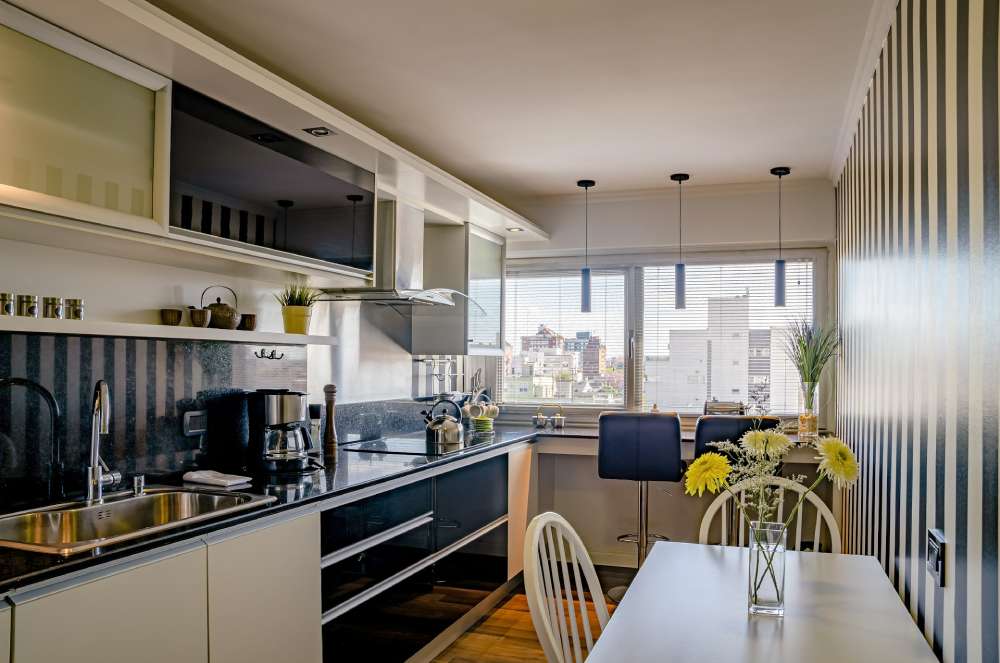Before embarking on the apartment hunt, it’s crucial to arm yourself with a thorough understanding of your financial landscape. Begin by meticulously identifying all potential income sources. This encompasses your regular salary and may include additional streams such as freelance work, investment returns, bonuses, or financial support from family members.
With the cost of living variable, especially in areas with apartments in The Domain, understanding the breadth of your income is vital for crafting a realistic budget that ensures you live within your means without unnecessary financial strain. Moreover, accounting for expected and irregular income allows you to anticipate cash flow fluctuations, keeping your budget resilient.
After delineating your total monthly income, it is prudent to follow the financial guideline of allocating no more than 30% of your income to rent. This proportion is a protective buffer, allowing ample room for other indispensable financial obligations, including savings, debt repayment, and leisure activities that contribute to a balanced and fulfilling life.
Contents
Categorizing Essential Expenses
With a comprehensive understanding of your income, the next step in effective budgeting is categorizing your essential expenses. This entails compiling a thorough list of all required monthly expenses, such as groceries, utilities, health insurance, and transportation.
I’d like to point out that this exercise helps highlight the full scope of your financial commitments and helps you to identify potential areas for optimizing efficiency. Moreover, categorizing these expenses enables you to prioritize spending and make informed decisions about where cuts can be judiciously made without compromising your quality of life.
Utilities and Groceries
Monthly utility bills encompass expenses like electricity, water, gas, and internet services, usually account for a sizable portion of your budget. Although their predictability provides some stability, grocery expenses often fluctuate due to various factors such as seasonality, dietary preferences, and lifestyle changes. Consider analyzing past grocery spending and implementing a meal-prepping plan to counteract these fluctuations.
According to a report by The New York Times, meal prepping curtails grocery expenses and contributes to a healthier diet by encouraging home-cooked meals over costlier restaurants. This dual benefit underscores the importance of diligent expense categorization and strategic planning in maintaining financial health, turning routine expenses into opportunities for savings and improved well-being.
Considering Unexpected Costs
When renting an apartment, anticipating unexpected costs is essential to protect your financial health. These expenses include emergency repairs, renter insurance premiums, and additional fees for building amenities like fitness centers or security features. Furthermore, upfront expenses like moving and security deposits should be factored into your budget.
Awareness and preparation for these potential outlays are key to maintaining financial stability and avoiding unpleasant surprises. Additionally, setting aside an emergency fund for unforeseen rental expenses can provide a financial cushion, allowing you to address these costs without disrupting your budget.
Insurance and Fees
Renter’s insurance, while often overlooked, plays a critical role in protecting your belongings and providing liability coverage. Its importance becomes evident in situations involving theft or accidental damage, where having this coverage can prevent significant financial setbacks. Similarly, some rental communities charge additional fees for amenities such as parking garages, extra storage spaces, or access to communal facilities.
Understanding these potential costs allows you to make well-informed decisions when selecting an apartment, ensuring it aligns with your financial constraints and lifestyle needs. By anticipating these expenses, you can better manage your finances and control your financial future.
Using Budgeting Tools
In today’s digitized environment, leveraging various financial tools is pivotal in crafting a sound budget. With the help of budgeting apps like Mint, YNAB (You Need a Budget), and PocketGuard, you can track your income and expenses in real time and obtain a thorough picture of your financial situation.
These apps go beyond simple tracking, offering alerts as you approach budgetary limits and fostering disciplined spending behaviors. The visual representation of your financial data can reveal spending patterns and trends, enabling you to make adjustments that positively impact your overall financial health.
Moreover, these advanced tools generate reports and charts that visualize your financial tendencies, identifying areas where you might be overspending. Utilizing these insights lets you optimize your budget effectively, ensuring your spending aligns with core priorities while fostering savings growth.
Embracing these tools transitions you from a reactive to a proactive financial strategy, embedding fiscal prudence into everyday decisions and laying the groundwork for financial success. By maintaining awareness and control over your finances, you cultivate peace of mind and ensure that your financial strategies support your current lifestyle and future ambitions.
Cost-Cutting Strategies
With a clear understanding of your spending landscape, the next focus should be discovering cost-cutting opportunities. Review discretionary expenses to identify areas ripe for reduction or elimination. Possible strategies include:
- Reducing dining out occurrences.
- Canceling unused subscriptions.
- Opting for public transportation over personal vehicle use, which can yield substantial savings over time.
These small yet impactful changes can significantly enhance your ability to manage your budget more effectively and free up resources for other priorities.
Practical Tips
Embracing home-cooked meals rather than dining out frequently can lead to considerable financial savings and promote a healthier lifestyle. Meal planning provides a structured approach to managing grocery expenses efficiently while reducing impulse purchases and food waste. In addition, preparing meals in bulk allows for cost-effectiveness and convenience without sacrificing quality.
Meanwhile, reviewing and discontinuing inactive subscriptions can liberate funds, refine your budget, and optimize resource allocation. When combined, these deliberate changes in spending patterns can save a substantial amount of money and enable you to more accurately and effectively reach your financial objectives. Developing a mindset focused on value and necessity over desire reinforces smart spending habits prioritizing long-term financial health.
Conclusion
Creating a carefully thought-out apartment rental budget is essential to reaching long-term stability and financial freedom. You can confidently navigate the ever-evolving rental market by understanding your income sources, categorizing necessary expenses, anticipating unforeseen costs, and leveraging modern budgeting tools.
This strategic planning is particularly crucial when considering premium options like apartments. Such thorough preparation transforms the experience into an empowering endeavor, offering immediate lifestyle benefits while fostering enduring financial wellness.
Armed with a robust budget, you can make informed, confident choices supporting current enjoyment and future aspirations. This proactive approach enhances your financial security and enriches your quality of life, paving the way for continued success and contentment in your housing journey.





